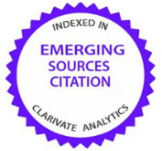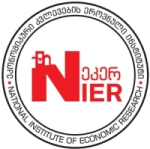Taxation of the Agricultural Sector in the System of Ukraine’s Economic Policy Implementation and its Digitalization
Abstract
Introduction. The agricultural sector is a strategically important segment for ensuring the country's national security. New challenges rightly require appropriate responses. All means of regulating the state agrarian sector, first of all, should be aimed at ensuring its successful development and effective functioning. The development of the agrarian sector of Ukraine requires the solution of institutional problems of agrarian production Studying literary sources indicates that state economic policy is implemented, primarily, through the mechanisms of tax policy, which has notes permanent changes in recent years.
Aim and tasks. The aim of this article is to research the taxation of the agricultural sector in the system of Ukraine’s economic policy implementation and its digitalization. A secondary aim would be to single out the advantages and disadvantages of the taxation system and to create recommendations on choosing a taxation system for subjects of the agrarian sector.
Results. The taxation of the agricultural sector in the system of Ukraine’s economic policy implementation and its digitalization are researched. Such stages of legal regulation of agricultural protection tax relations as formation (establishment), relative permanence, reformation, and post-reformation (post-reform stage) are defined. The agricultural protection tax measures in terms of VAT taxation during the period are performed. The advantages and disadvantages of the taxation systems of agricultural sector entities are singled out. Recommendations on choosing a taxation system for subjects in the agrarian sector are formed. The structure of the "Manager" module in the program "BAS AGRO. Accounting" is shown.
Conclusions. Each of the tax systems that can be used by subjects of the agrarian sector has its own advantages and disadvantages. It is necessary to take into account the conditions under which a specific enterprise operates. The performed analysis of the evolution of the tax legislation in terms of taxation of the agrarian sector indicates a reduction in agro-protective actions by the state. At the stages of formation (establishment) and relative permanence of legal regulation, the introduction and effective use of tax policy, in particular the fixed agricultural tax and the special VAT taxation regime, were observed. During the reform and post-reform stages, the agricultural protection measures outlined above, which were quite powerful and effective at the time, were significantly minimized. The actual adaptation of information technologies to the needs of agriculture is one of the best new technologies in the agricultural sector.
References
Avarmaa, M., Hazak, A., & Männasoo, K. (2011). Capital structure formation in multinational and local companies in the Baltic States. Baltic Journal of Economics, 11(1), 125–145. https://doi.org/10.1080/1406099X.2011.10840494
Bagriy, T. (2004). The role of integration in overcoming the crisis situation in sugar beet production. Economy of agro-industrial complex, 1, 50-52.
Balanyuk, I. (2000). Agrarian relations: socio-economic essence and place in the system of social relations. Economy of agro-industrial complex, 8, 68-73.
Bondarevska, K. (2015). The concept of state regulation of the agro-industrial complex: a historical excursion. BusinessInform 8 146-152.
Desai, M., Foley, C., & Hines, Jr. (2004). A multinational perspective on capital structure choice and internal capital markets. The Journal of Finance, 59(6) 2451–2487. https://doi.org/10.1111/j.1540-6261.2004.00706.
Feldmann, H. (2011). The unemployment puzzle of corporate taxation, Public Finance Review, 39(6), 743–769. https://doi.org/10.1177/1091142111423019
Fuest, C., Peichl, A., & Siegloch, S. (2015). Do higher corporate taxes reduce wages? Micro evidence from Germany. Micro Evidence from Germany. ZEW-Centre for European Economic Research Discussion Paper (16–003). https://doi.org/10.2139/ssrn.2739611
Grigorieva, H. (2020). Conceptual principles of legal regulation of state support for agriculture in Ukraine: thesis. Odesa.
Hinson, R., Lensink, R., Mueller, A. (2019). Transforming agribusiness in developing countries: SDGs and the role of FinTech. Current Opinion in Environmental Sustainability, 41 1–9. https://doi.org/10.1016/j.cosust.2019.07.002
Ivanchenkova, L., Skliar, L., Pavelko, O., ChebanYu., Kuzmenko, H., Zinkevych A. (2019). Improving accounting and analysis of innovative costs. International Journal of Innovative Technology and Exploring Engineering, 9, 4003–4009.
Janský, P. (2019). Effective tax rates of multinational enterprises in the EU (A report commissioned by the Greens/EFA Group in the European Parliament). https://www.wts.com/wts.de/publications/wts-tax-eekly/anhange/2019/2019_3_1_studie.pdf
Kluzek, M., Schmidt-Jessa, K. (2022). Capital structure and taxation of companies operating within national and multinational corporate groups: evidence from the Visegrad Group of countries. Journal of Business Economics and Management, 23(2) 451–481. https://doi.org/10.3846/jbem.2022.15634
Klyunok, V. (2018). State regulation of the country's grain market. Economics of agricultural and processing enterprises. 11, 10–14.
Kovalchuk, I., Melnyk, V., Novak, T., & Pakhomova, A. (2021). Legal Regulation of Agricultural Taxation. European Journal of Sustainable Development, 10(1), 479. https://doi.org/10.14207/ejsd.2021.v10n1p479
Litvin, O. (2013). Peculiarities of the agrarian policy of the EU countries and the US is on the grain market, Economy of Ukraine, 12 С. 78–81.
Löffler, M., & Siegloch, S. (2021). Welfare effects of property taxation. ZEW-Centre for European Economic Research Discussion Paper, (21-026).
Malik, M., & Fedienko, P. (2003). Agrarian reform and development of entrepreneurship, Кyiv.
Navalnev, O. (2020). Taxation of agribusiness: the latest novels. Yuridichna Gazeta.
Nitsenko, V. (2014).Theoretical principles of functioning of vertically integrated structures in the agro-industrial complex. Economy of agro-industrial complex, 2, 63-69.
Nivyevskyi, O, & Neute, R. (2020) New system of support for farmers in Ukraine: who really wins? https://kse.ua/ua/community/stories/the-new-agricultural-support-system-in-ukraine-who-really-benefits/
Osadcha, O., Liashenko, O., Pavelko, O., Markov, R., & Yurkiv, N. (2020). Methodology of financial and economic analysis of innovative activities of enterprises in the conditions of the digital economy. Financial and credit activity: problems of theory and practice, 35, 202-211.
Pavelko, O., Zaluzhnyi, A., Trofimcuk, N., Prokopchuk V. (2021). Transformation of consumer needs in the context of personality environmental culture formation and innovative development of national economy. IOP Conference Series: Earth and Environmental Science, 915(1). https://iopscience.iop.org/article/10.1088/1755-1315/915/1/012013
Popova, V. (2005). Formation of the agricultural sector of the economy of Ukraine in the conditions of international competition. Economy of agro-industrial complex, 4, 131-137.
Ruiz-Real, J, Uribe-Toril, J., Torres, J., De Pablo, J. (2021). Artificial intelligence in business and economics research: Trends and future. Journal of Business Economics and Management, 22(1), 98–117. https://doi.org/10.3846/jbem.2020.13641
Rybalchenko, L., Ryzhkov, Ed., & Ohrimenco, S. (2021). Modeling economic component of national security. Philosophy, Economics and Law Review. 1 (1), 25-36.
Sabluk, P., Kaliev, G., Sabluk, V., Grigoruk, V., & Vlasov, V. (2008). World and regional production of agricultural products: monograph, Kyiv.
Tax Code of Ukraine (2010). https://zakon.rada.gov.ua/laws/show/2755-17#Text
Verkhovna Rada of Ukraine (1997). On value added tax: Law of Ukraine, April 3, 1997. Information of the 21. Art. 156.
Zirgulis, A., & Šarapovas, T. (2017). Impact of corporate taxation on unemployment. Journal of Business Economics and Management, 18(3), 412-426. https://doi.org/10.3846/16111699.2016.1278400
If the article is accepted for publication in the journal «Economics. Ecology. Socium» the author must sign an agreementon transfer of copyright. The agreement is sent to the postal (original) or e-mail address (scanned copy) of the journal editions.






















